

 |
 |
|
 |
|
| About Us |
|
Read Past Issues | Resources | Composer Links |
Born in Paris in 1950, the daughter of jazz composer Errol Parker, Lauten acquired a deep understanding of improvisation and studied classical piano. Her first composition was well-received at the Paris Museum of Modern Art (1972), when she was 22. Shortly after, she moved to New York where she was discovered by poet Allen Ginsberg, whose purchase of a Farfisa organ for her dramatically changed the course of her musical career, exposing her to the possibilities of music produced electronically. Ginsberg also introduced her to Buddhism. She moved permanently to New York and became active on the music scene in the late 70s, performing at the Ear Inn, A’s, CBGBs, Max’s Kansas City, the Mudd Club, Folk City, Inroads and The Kitchen. During the 80s, she started producing and releasing her own music; she studied privately with LaMonte Young; spiritual discipline and the study of Buddhism were an integral part of her training; she was a disciple of Sri Chinmoy, Paramahansa Yogananda and Chogyam Trungpa; she received a Master's in composition from New York University where she studied Western composition with Dinu Ghezzo and Indian classical music with Ahkmal Parwez. Lauten's most recent CD--Waking in New York, Portrait of Allen Ginsberg from the poetry of Allen Ginsberg--is both a monument to the past and a tribute to life in New York City. During the 90s she took a two-year 'sabbatical' in New Mexico to concentrate on her compositions, returning to New York in 1996 and felt impelled to write a piece about her regained city. She asked her old friend Ginsberg for a libretto. He responded with a group of highly personal poems. Six months later--in April 1997--Ginsberg died, and soon afterward, Lauten's father died as well. Lauten continued to work on the piece and it was premiered in June 2001. "Waking in New York is actually a lovely, effective and affecting song cycle for vocal ensemble and orchestra," wrote Allan Kozinn, in the New York Times. "Ms. Lauten has treated Ginsberg's poetry and its underlying spirit carefully, even reverently. She tucked its personal and sometimes diarylike texts into her own agreeably melodic and ecclectic style, but she also appears to have listened carefully for traces of the music that animated Ginsberg's soul." In
the liner notes, composer and critic Kyle Gann writes: "For all that
Lauten came upon her musical idiom through her own idiosyncratic evolution,
it nevertheless falls into a tradition, appropriately one with both American
and French roots. Her syllabic, chantlike text setting follows an American
usage, quite different from the melismatic European tradition based on
Italian opera. The tradition is traceable back through Robert Ashley and
Harry Partch to Virgil Thomson, whose operas with Gertrude Stein have a
similar repeated-note urgency. And Thomson honed his craft in Paris under
the spell of the great musical trickster Erik Satie, whose magnum opus
Socrate is the closest musical kin to Waking in New York. Satie in Paris,
Socrates in Athens, Lauten and Ginsberg in New York, all know that we can
see the universe in a grain of sand. And with Ginsberg affording the grains
of sand, Lauten can provide the universe."
|
|
An Interview with Tobias Picker Handmaid Tale's Debuts in English Rautavaara Joins B&G Who's Afraid of Julia Wolfe Derek Bermel's Soul Garden The Pianist: The Extraordinary True Story of Wladyslaw Szpilman John Adams' Atomic Opera A Bridge Not Far Enough Turnage Signs With B&H Sophie's Wrong Choice Copland's Mexico On Being Arvo Rzewski Plays Rzewski Praising Lee Hyla David Lang's Passing Measures Three Tales at BAM Naxos at 15 On the Transmigration of Souls Dead Man Walking David Krakauer's The Year After Steve Reich/Alan Pierson
|
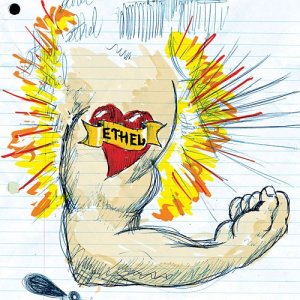
Ethel Composers: King, Kline, Reynolds, Ziporen Performers: Ethel Cantaloupe New
York's most daring string-quartet sensation, Ethel, makes its debut here
with a menu of the kind of hard-edged downtown music that has won the group
a big following in the NY new music scene. Todd Reynolds and
Mary Rowell, violins; Ralph Farris, viola; and Dorothy Lawson, cello—all
began their careers in New York as freelance musicians, playing difficult
music that relies heavily on non-classical sources but requires a virtuoso
classical ensemble to play. Its repertoire ranges from John King's energetic
blues transcriptions to the gnarly quartets of Julia Wolfe
and on Todd Reynolds' quirky
|
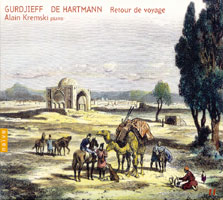
Return from a Journey Composers: Gurdjieff, De Hartmann, Performer: Kremski Naive Gurdjieff
was a Russian Aremenian spiritual master who, in addition to the main body
of his teaching created sacred dances, or Movements, as well as 200
or so musical compositions--all of which were were done in collaboration
with German composer Thomas de Hartmann at Gurdjieff's Institute
for the Harmonious Development of Man, near Paris, in the years 1925–27.
For many years, the pieces heard here were played only by De Hartmann or
another of Gurdjieff's disciples but in recent years they have attracted
the interest of a number of adventuresome pianists. Kremski plays
these exotic, vaguely oriental and oddly thematic pieces with great respect
and warmth.
|
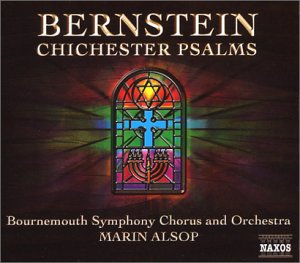 Chichester
Psalms
Chichester
Psalms
Composer: Leonard Bernstein Performers: Bournemouth Symphony Orchestra and Chorus, Marin Alsop (conductor) Naxos Commissioned in 1965 by the Dean of Chichester, Bernstein’s colorful Chichester Psalms is one of the composer’s most successful and accessible works on religious texts, contrasting spiritual austerity with impulsive rhythms in a contemplation of peace. The composer fashioned his Oscar nominated score to the 1954 movie On the Waterfront into a symphonic suite, skillfully capturing the oppression of the New York dockyards in the ’50s. The Three Dance Episodes were extracted from the popular On The Town, Bernstein's first successful foray into musical theatre. Bernstein protege Marin Alsop gets a robust performance from Bournemouth orchestra and chorus. |
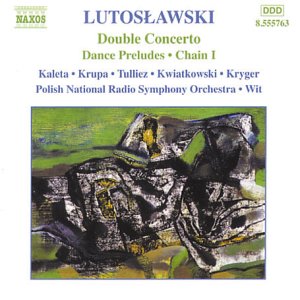
Double Concerto Composer: Witold Lutoslawski Performers: Polish National Radio Symphony, Antoni Wit Volume 8 in Naxos' indispensible survey of Lutoslawski's orchestra work brings us into lesser known territory but there are still treasures to be found. The Dance Preludes from 1955 is basically a five-movement clarinet concerto, with lots of interesting harmonies and rhythmic twists and turns. The Double Concerto for oboe and harp from 1990 rattles the ear a bit and has a demanding oboe part, beautifully played by Arkadiusz Krupa. The Children's Songs, gorgeously sung by the soprano, Urszula Kryger, are beguiling. |
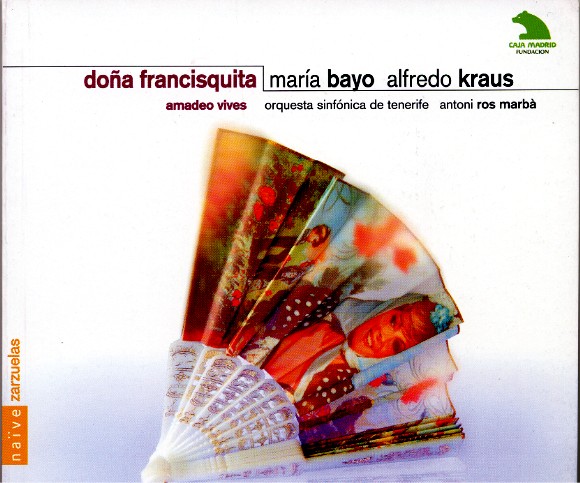
Doña Francisquita Composer: Amadeo Vives Performers: Maria Bayo, Alfredo Kraus, Orquesta Sinfonica de Tenerife, Antoni Ros Marba Naive A superb performance of Amadeo Vives' zarzuela masterpiece, sung with enormous vivacity and brio by the ravishing-voiced Maria Bayo and the sturdy Alfredo Kraus. With its nineteenth century Madrid setting, its roots in classical Spanish drama and its festive nocturnal amours, Doña Francisquita provides a retrospective on the romantic zarzuela tradition and its crowning glory. The work was immediately recognized not only as Vives’ masterpiece, but as the greatest full length zarzuela of its era. If you're not into zarzuela already, this is the perfect place to start your collection. |
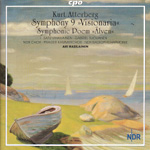
Symphony 9 Visionaria Composer: Kurt Atterberg Satu Vihavainen (mezzo-soprano); Gabriel Suovanen (baritone) NDR Choir, Prague Chamber Choir NDR Radio Philharmonic, Ari Rasilainen CPO The 9th and final symphony of Swedish composer Kurt Atterberg bears a superficial relationshp to Beethoven's 9th with its big, expresssive choral sound but Atterburg's world is a good deal less joyous. Atterberg's choice of texts reflects the lasting impact on his psyche made by World War II and the Korean War. The Poetic Edda, an Icelandic epic dating from around 1270, relates the visions of a wise prophetess (hence the Symphony's title "Sinfonia Visionaria") who foretells the creation of the world, the warring among gods, giants, and humans, the world's destruction, and finally its recreation. Atterberg uses mezzo-soprano and baritone soloists with chorus and large orchestra, as well as a quasi-oratorio form, to tell his epic tale. This is extraordinary symphony by a composer who is far too little-known in the musical world. |
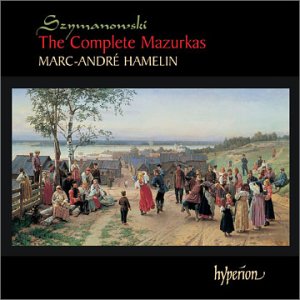
The Complete Mazurkas Composer: Karol Szymanowski Performer: Marc-Andre Hamelin Hyperion Marc-Andre Hamelin continues his extraordinary journey through the forgotten rivers and bayous of the modern piano repetoire with masterful performances of Szymanowski's Twenty Mazurkas, Op. 50, composed between 1926 and 1931. After assimilating the influence of Stravinsky, Szymanowski began looking for folk themes in Polish music to rival the Russian folk touches of the master. The Mazurka, a traditional Polish dance in three-quarter-time with an often erratic-seeming emphasis on the second beat, (and a favorite form for Chopin) offered great possibilities . These highly diverse pieces are more complex than Chopin, more modern and dissonant, yet also more muted and elusive. Still, Szymanowski remained too much a romantic to settle for anything less then flamboyant virtuosity--a quality that Hamelin possses by the truckload. |
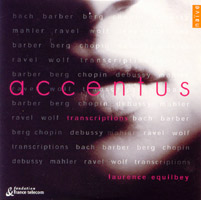
Accentus Composers: Transciptions: Bach, Barber, Berg, Chopin, Debussy, Mahler, Ravel, Wolf Peformers: : Choeur De Chambre Accentus, Equilbey Naive Worth having for the ravishing performances of Samuel Barber's "Adagio" and Mahler's "Adagietto from Symphony No. 5." |
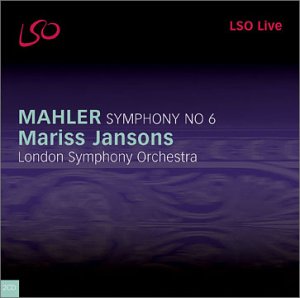
Symphony No. 6 Composer: Gustav Mahler Performer: London Symphony Orchestra; Mariss Jansons Label: LSO Live It is rare that you find a recording that you need listen to for only a minute to know a masterpiece is unfolding before your very ears. This stunning live performance of Mahler's "Tragic" symphony is one of the rare ones, From the first rhythmic thumps of the long and stately funeral march to the final faded chords, Mariss Jansons draws a passionate and committed performance from the LSO. Certain to be among the best of the year noninees. |

Wheel of Emptiness Composer: Jonathan Harvey Performers: Actus Cyprès CYP5604 English composer Jonathan Harvey is one of those modernists whose work is more frequently talked about then played. This rare recording contains five representative works ranging from the lyrical to the raw, built on instrumentations ranging from electroacoustical to the traditional. An excellent introduction to an unjustly neglected maverick. |
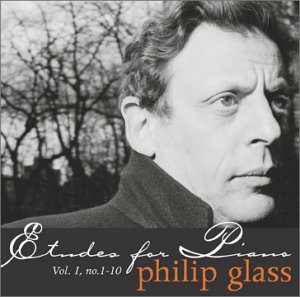
Piano Etudes 1 Composer: Philip Glass Performer: Philip Glass Orange Mountain Glass says he wrote these "studies" as fodder for his own concert performances and as a way of challenging himself as a pianist. But, they are much more important than that. They provide a real insight into how Glass composes and, although billed as sketches, sometimes are more rewarding to the ear and intellect than many of Glass's larger-scale works. Essential recording for the Glassologist. |
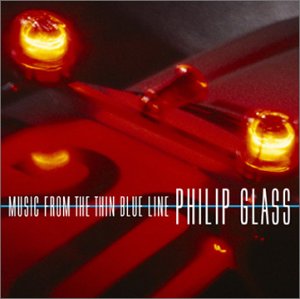
Music from the Thin Blue Line Composer: Philip Glass Orange Mountain Glass's hypnotic score for Errol Morris’ extraordinary 1988 documentary film entitled "The Thin Blue Line". Nonesuch Records released a CD of the film’s soundtrack that included the narration and interviews from the film but this Orange Mountain release contains the original score without the voice-over. The music is dark and brooding, full of tension appropriately for such a chilling film, and it stands well on its own. |
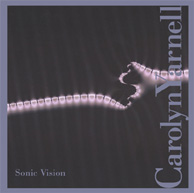
Sonic Vision Composer: Carolyn Yarnell Tzadik Inspired by the beauty and power of nature, the music of Carolyn Yarnell straddles the borders of minimalism, romanticism and Baroque. Sonic Vision, the first CD devoted entirely to her music, contains the powerful electronic composition Love God, a beautiful solo piece for Baroque flute, a minimalist suite for chamber ensemble and a powerful extended work for computer piano. Lyrical and mystical music that evokes volcanoes, birds and the Rocky Mountains. |
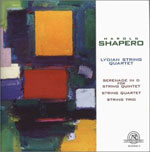
Chamber Music Composer; Harold Shapero Performers: Lydian String Quartet New World Records - Shapero’s (b. 1920) vastly underrated portfolio is one of the great undiscovered treasure troves of American neoclassicism. The String Trio, the String Quartet, the Serenade in D offer a broad-based introduction to Shapero’s compositional thought processes. Beautiful, committed playing by the Lydian String Quartet. |

Drumming Composer: Steve Reich Performer: Ictus, Synergy Vocals Cypres Reich's 1971 masterpiece gets a spirited workout by the Belgian new music group Ictus. Drumming is constructed around one single basic rhythmic-melodic pattern, for an imposing ensemble of percussion (bongos, marimbas, glockenspiel) joined by some female voices, a piccolo flute or a whistling part. The breathtaking feeling of simplicity/complexity in this work is transmitted with an amazing skill by the Belgians. |
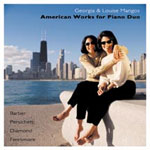
American Works for Piano Duo Composer(s): Barber, Persichetti, Diamond, Fennimore Performer (s): Georgia & Louis Mangos Cedille Records Barber's homage to the Plaza Hotel's Palm Court, Souvenirs, Op. 28, has never sounded better or more nostalgic and Joseph Fennimore's Crystal Stairs also invokes the quintessential American city. The real surprise here are the two pieces by Vincent Persichetti, which invoke a more dynamic and rough and tumble form of Americanism. The Mango sisters display formidable technique and taste. |
 |
Search WWWSearch www.sequenza21.com |
